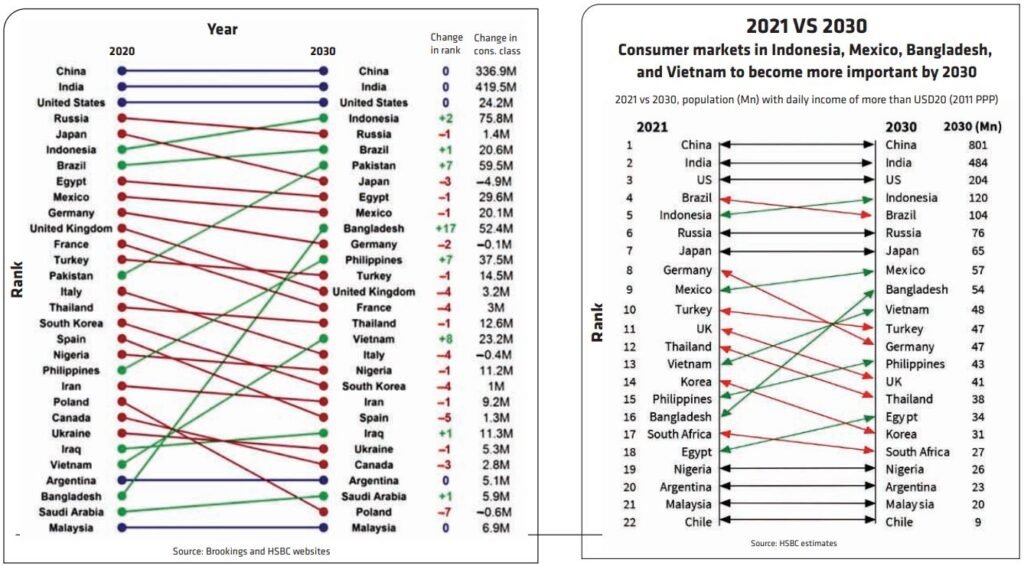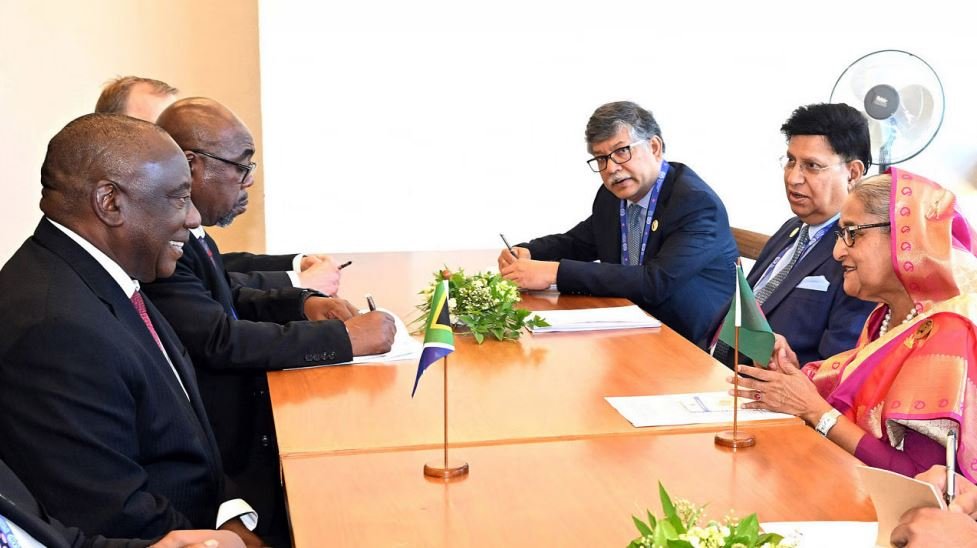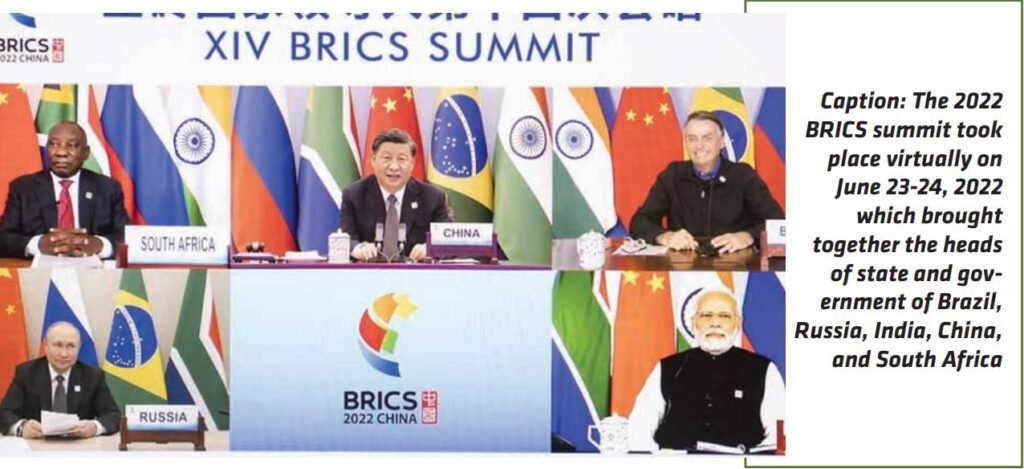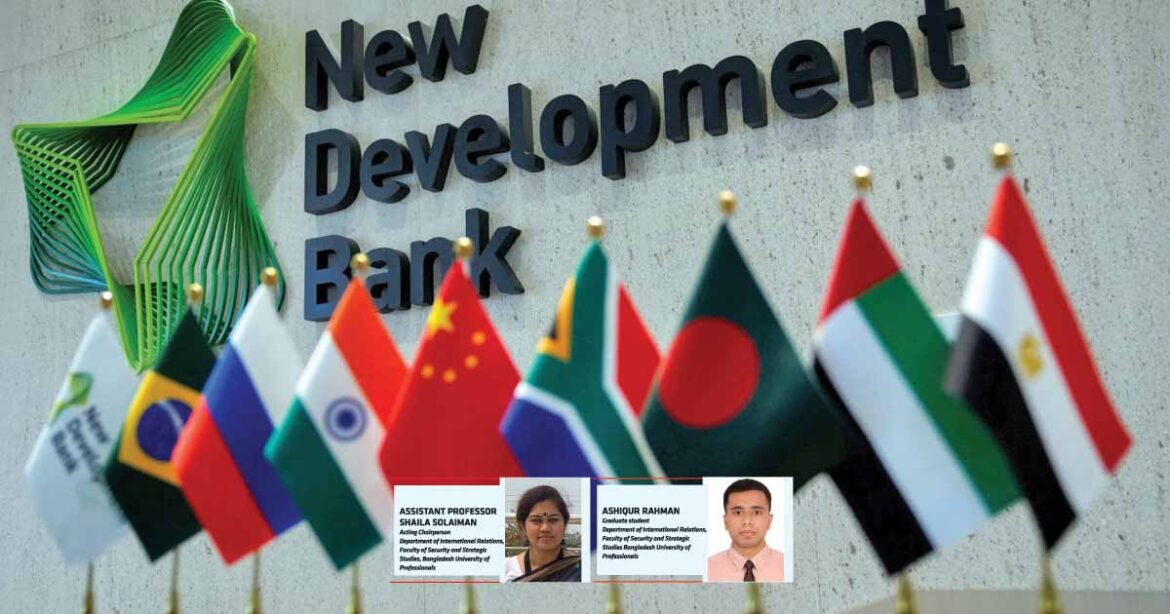Four developing economies represented by the acronyms “BRICs” are Brazil, China, India, and Russia. In his 2001 report, Building Better Global Economic BRICs, Goldman Sachs analyst Jim O’Neill described the group as the most promising emerging market economies and predicted that their relative size and market share in the global economy would rise rapidly. In their study titled “Dreaming with BRICs: The Path to 2050,” Dominic Wilson and Roopa Purushothaman (2003) expanded on the premise that the GDP of the BRICs will likely outstrip that of the G7 by 2025. Following the BRIC summit in Russia in 2010, South Africa joined the club, which was then renamed BRICS.
You Can Also Read: BRICS: EXPANDING HORIZONS, EMBRACING DIVERSITY, AND FOSTERING COOPERATION
The group set out on its journey with the initial objective of providing member nations with a mechanism to work more closely together on common economic and development challenges. BRICS sees itself as a credible alternative to the Group of Seven (G7) nations as well as a representative of the “Global South” at the moment. BRICS and its applicant states are more likely to support the liberal international order that will address the existing unpredictable risks and fault lines, which include, among other things, geopolitical and geo-economics issues, but are not limited to these. This is despite the fact that they dream of a “more inclusive” world order. In order to improve its position globally, the organisation is therefore eager to increase its membership around the globe.
SETTING THE CONTEXT FOR BANGLADESH’S BRICS INVOLVEMENT
BRICS membership came up while Prime Minister Sheikh Hasina was visiting Switzerland on June 14– 15, 2023. South African President M. Cyril Ramaphosa handled the issue favourably after speaking with his counterpart from Bangladesh. According to Bangladesh’s Foreign Minister AK Abdul Momen, Bangladesh will submit an application to join BRICS in August of this year. In addition to this, BRICS should carefully consider Bangladesh’s current political and financial situation while allowing Bangladesh as its member.
TO WHAT EXTENT DOES BRICS NEED BANGLADESH?
Several significant political and non-political crises have occurred since the beginning of the 21st century. Political conflicts, such as Russia’s invasion of Georgia in 2008, Crimea’s annexation, and a special operation in Ukraine in 2022, among others, have more severe economic repercussions than an unrelated catastrophe like COVID-19 on a global scale. The dollar’s central role in global finance as a medium of exchange and a reserve for foreign exchange (Forex) made it possible for the USA-led West to deploy embargoes and sanctions against potential adversaries more as a weapon than a diplomatic instrument. The BRICS group sees de-dollarization (the process of moving away from the dollar to a national currency for foreign exchange and trade, inter alia) as a workable solution to weaken the power of the USA-led global North.

By exchanging local currencies instead of using the dollar or the Society for the Worldwide Interbank Financial System (SWIFT), Bangladesh can support the de-dollarization initiative being led by the BRICS. The bloc will have a stronger de-dollarization stance the more members it has. Twenty-two groups have officially applied to join the group, but more than forty states have expressed a strong desire to join, according to the South African diplomat in charge of BRICS relations. The credibility of exchange between national currencies will be strengthened as a result of horizontal growth. Even Bangladesh has paid a debt in Indian rupees to India and a payment in Chinese Yuan to Russia. Another element supporting Bangladesh’s membership in the BRICS is the country’s expanding market.
Bangladesh’s economy is one of the fastest-growing in the world and is the 35th largest in the world, Bangladesh will also hold the 20th position by 2037
-The World Economic League (WEL, 2023)
Bangladesh’s economy is one of the fastest-growing in the world and is the 35th largest in the world, according to data from the World Economic League (WEL, 2023). Bangladesh will also hold the 20th position by 2037, as predicted by the World Economic League (WEL, 2023). In addition, up from its current rankings of 28th and 16th, Brookings and HSBC predict that Bangladesh would rank 11th and 9th in the world in terms of consumer markets by 2030, respectively. Several of the BRICS countries have long been drawn to this stable financial climate. According to data from the United Nations Trade Commodity Trade Database (UN COMTRADE, 2023), Bangladesh’s import market is divided, respectively, by China, India, Brazil, and Russia (22%, 13%, 2.7%, and 1.3%).

Furthermore, the combined export share of this trade bloc in Bangladesh would rise dramatically if the Kingdom of Saudi Arabia, the United Arab Emirates, the Republic of Indonesia, the Argentine Republic, and the Arab Republic of Egypt are included in the future BRICS conference. Additionally, the BRICS bloc will strengthen trade linkages between diverse regions of the world with the addition of these states as members.
Bangladesh can be the pivot of the BRICS Plus. Because BRICS is going to incorporate more of the five earlier-mentioned nations. Their seaports can be connected through the sea ports of Bangladesh. thus, incorporating the Middle East and North African (MENA) region. Except as a member of the South Asian Association for Regional Cooperation (SAARC) and the South Asian Free Trade Area (SAFTA), Bangladesh can connect South Asian states alongside the Association of South East Asian Nations (ASEAN). So, Bangladesh can combine many states from multiple geographical areas at a time.
Security is another crucial determinant of Bangladesh’s incorporation in BRICS, although BRICS was born out of financial considerations. In the recent foreign ministers’ meeting, non-traditional security threats, mainly violent extremism and environmental degradation were discussed more. Bangladesh, like other BRICS nations, is one of the most vulnerable states to natural disasters. Bangladesh’s terrorism index is now 4.41, which was 4.42 earlier, and it is the 7th most disaster-prone state according to the Global Climate Risk Index 2021, which has been stable since the 2000–2019 period.
Moreover, Bangladesh is the chair of the Climate Vulnerable Forum (CVF) and often remains vocal about non-traditional security threats. How Bangladesh can assist BRICS by sharing its experience of countering violent extremism and remaining vocal regarding global environmental policies that will benefit both BRICS and Bangladesh. But, yet, Bangladesh must respond to the BRICS according to its strategic autonomy, i.e., both what the BRICS can supply and what Bangladesh can demand.
HOW COME BANGLADESH IS SO EAGER TO JOIN THE BRICS?
The dynamic and unstable nature of internal and international political, financial, and other issues is a major motivator for Bangladesh’s participation in multilateral forums like BRICS. Bangladesh is experiencing financial strain, much like the rest of the globe, which can only be relieved by extensive economic cooperation and investments. Bangladesh needs people who it can maintain lasting business ties with in this area. According to data assessed from the United Nations Commodity Trade Database (UN COMTRADE, 2023) Bangladesh has considerable trade links with the BRICS group, spanning imports, exports, and foreign direct investment. The BRICS have recently surpassed the G7, according to data from the economic research firm Acorn Macro Consulting (2023), with a proportion of the world GDP (Purchasing Power Parity, PPP) of 31.5% as opposed to the latter’s 30.7%. So, Bangladesh’s GDP will primarily increase as a result of joining the BRICS.
In addition, investors’ perception that Bangladesh is a member of the largest group of developing economies suggests that Bangladesh may be advantageous for foreign investments. Additionally, there is a chance that bilateral trade between member countries may increase. Bangladesh now has more access to bank loans, other financial opportunities, and the creation of developmental policies as a member of the BRICS Bank or the New Development Bank (NDB). More than just economic objectives, joining the BRICS organisation appears to be motivated by a strategic political approach.
The diversification of Bangladesh’s foreign policy away from the West has been more facilitated by a few recent and the past domestic socio-political events. The current political government in Dhaka is under condemnation from developed countries, primarily over problems associated with democracy, human rights, repression of the opposition, and a free and fair electoral process. According to BBC Bangladesh, as a result of these, Bangladesh has been subject to visa restrictions over the previous few years. This precautionary measure seems to be a warning. New immigration laws were put in place to support a free and fair election in Bangladesh. It should be emphasised that the US Treasury Department sanctioned the Rapid Action Battalion (RAB) and seven of its current and former members due to human rights breaches.
Bangladesh will receive political support from the BRICS once it joins. Considering that it has two of the permanent members of the UN Security Council (UNSC) and India, arguably the world’s largest democracy. Furthermore, even on the subject of Bangladesh’s electoral system, China and Russia are reticent to provide their opinions. The current Indian government in New Delhi is friendly with the Dhaka administration as well. Therefore, improving ties with the BRICS can assist Bangladesh avoid any kind of Western restrictions.

Bangladesh’s participation is driven by both economic and political demands. Despite, it’s crucial to evaluate the costs and befits of participating BRICS. Because, there will not be any immediate gain from participation in the BRICS. Rather, Bangladesh may face a series of challenges.
The United States is a promising partner for Forces Goal 2030, a programme to upgrade Bangladesh’s armed forces, to begin with. The General Security of Military Information Agreement (GSOMI) and the Acquisition and Cross-Service Agreement (ACSA) are both willing to be signed by the United States. One of the four basic treaties that the United States signs with its allies or close partners to strengthen military-to-military cooperation is the last one, according to Hannan and Morsalin (2022).
Second, Bangladesh will soon experience financial difficulties. Even while it would politically balance the USA, it might be at an economic disadvantage. Bangladesh has a positive trade balance; the USA is Bangladesh’s biggest export destination, receiving 20% of the country’s exports. Moreover, Bangladesh has a positive trade balance with the USA-led G7 except for Japan. In contrast, Bangladesh has a negative trade balance with all the countries in the BRICS bloc as per the statistics analysed from the United Nations Trade Commodity Trade Database (UN COMTRADE, 2023).
Additionally, BRICS still has to grow more as a cohesive economic bloc. De-dollarization will therefore be more difficult in practise. The International Monetary Fund (IMF) accounts about 60% of the foreign exchange reserve is held in dollars, while a Statista (2023) reveals that 44.4% of international payments and 50.8% of international securities are made in dollars. In the BRICS, there are more fractures of hatred than there are joints of amity. The Sino-Indian competition has its own dimensions, both diplomatically and politically.
Bangladesh needs to get ready to join the group because, aside from China and India, its relations with the other two key members are still in the early stages. China may revitalise its state-sponsored initiatives like the Belt and Road Initiative through the BRICS. Additionally, humanistic concerns like labour rights and structural inequities, among others, are not as carefully considered in loans from the New Development Bank and the Asian Infrastructure and Investment Bank. While the Chinese and antiWestern financial systems primarily overlook environmental and humane issues, the International Monetary Fund (IMF) and other World Bank Groups (WBG) are far more cautious about these matters. Bangladesh needs to boost up its strategic autonomy to bring the balance in its favour while joining the BRICS.


